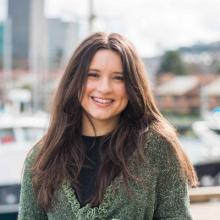Atlanta-Marinna Grant
Why did you decide to pursue a graduate degree?
Throughout my undergraduate career, I had many lingering questions around food justice and food 'waste' narratives that I felt weren't answered, and I felt were missing the Indigenous voice. As I started growing in culture, these thoughts and growing desire to reconnect with my Wendat culture became top of mind. Applying and going to graduate school became a portal to dive into the injustices I viewed in our food system, while simultaneously begin the inner work of reconnecting with my own communities knowledge.
Why did you decide to study at UBC?
When deciding what school to apply for, I truly searched for professors and departments I felt were doing grassroot and community-led engagement in a thoughtful and ethical way. Spaces I could grow and learn in, but also a space in which uplifted all voices around them. UBC, held these professors and space to foster these questions critically. These reasons and the opportunity to experience a different part of Canada!
What is it specifically, that your program offers, that attracted you?
Interdisciplinary approaches to understanding and aiding in our climate crises and an environment to think critically about the frameworks and languages used in present-day environmental-based movements.
What was the best surprise about UBC or life in Vancouver?
Truly, the 360 degrees of mountains everywhere, and the number of ways to connect with the natural environment, are never-ending and right at your fingertips.
What aspect of your graduate program do you enjoy the most or are looking forward to with the greatest curiosity?
My favourite part of my graduate program is the community engagement it allowed, wasn't just desk-promoted work. I am looking forward to my fieldwork the most, and the time this will allow within community itself.
What do you see as your biggest challenge(s) in your future career?
I think the biggest challenge rests on the hardest to understanding inquiry around the space and weaving of Indigenous knowledge into settler/colonial systems. Does this research serve the local communities first and foremost, but is there even space for it within colonial systems? How does the knowledge stay protected.
How do you feel your program is preparing you for those challenges?
I'm not too sure yet as I am in the middle of this process, but I feel this program allows the fluidity and critical thinking in allowing this question to stay complex. Allow the individual communities to answer, and protect this process as it is ongoing.
What aspects of your life or career before now have best prepared you for your UBC graduate program?
I believe taking the time off after my undergrad to work full-time allowed me the space and time to think about my time here at UBC. How I wanted to make the most of it, what I really wanted to learn.
What do you like to do for fun or relaxation?
Singing, creative writing, beading, snowboarding and cooking!
What advice do you have for new graduate students?
Be empowered by the unknown and it is ok to think 'differently.' Coming into my Master's I felt there should be a blueprint of sorts to walk me through the process. In reality, it was tons of twists and turns, and learning through mistakes. This actually became a critical viewpoint for how my research came to be, the twists and turns around the complexity of our food system and Indigenous-led collaboration. We can't possibly know everything, but we do get a small window in research to try to see and understand the world through this lens. It is ok if how you see the world/wish to understand it is different than the ways enforced, embrace it all.
